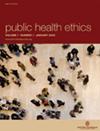自闭症和超敏感友好型工作环境的权利。
IF 2
3区 哲学
Q2 ETHICS
引用次数: 4
摘要
许多自闭症患者对某些感官刺激极度敏感。对于这一群体,以及有感觉处理障碍的非自闭症个体来说,暴露在荧光灯、香水气味和各种声音和噪音中是真正的折磨。在这篇文章中,我考虑了这种冒犯对办公空间设计的规范含义,这是一个尚未受到哲学家关注的话题。在确定了在这些空间中保护超敏感工人感官的不同方式之后,我指出,许多这样的安排都是可以以合理的成本完成的,然后才提出这样做应该是一项法律要求。本文章由计算机程序翻译,如有差异,请以英文原文为准。
Autism and the Right to a Hypersensitivity-Friendly Workspace.
Many individuals on the autism spectrum are hypersensitive to certain sensory stimuli. For this group, as well as for non-autistic individuals with sensory processing disorders, being exposed to e.g. fluorescent lights, perfume odours, and various sounds and noises can be real torment. In this article, I consider the normative implications of such offence for the design of office spaces, which is a topic that has not received any attention from philosophers. After identifying different ways in which the senses of hypersensitive workers might be protected within these spaces, I show that many of such accommodations can be made at reasonable cost, before arguing that doing so ought to be a legal requirement.
求助全文
通过发布文献求助,成功后即可免费获取论文全文。
去求助
来源期刊

Public Health Ethics
PUBLIC, ENVIRONMENTAL & OCCUPATIONAL HEALTH-MEDICAL ETHICS
CiteScore
3.10
自引率
9.50%
发文量
28
审稿时长
>12 weeks
期刊介绍:
Public Health Ethics invites submission of papers on any topic that is relevant for ethical reflection about public health practice and theory. Our aim is to publish readable papers of high scientific quality which will stimulate debate and discussion about ethical issues relating to all aspects of public health. Our main criteria for grading manuscripts include originality and potential impact, quality of philosophical analysis, and relevance to debates in public health ethics and practice. Manuscripts are accepted for publication on the understanding that they have been submitted solely to Public Health Ethics and that they have not been previously published either in whole or in part. Authors may not submit papers that are under consideration for publication elsewhere, and, if an author decides to offer a submitted paper to another journal, the paper must be withdrawn from Public Health Ethics before the new submission is made.
The editorial office will make every effort to deal with submissions to the journal as quickly as possible. All papers will be acknowledged on receipt by email and will receive preliminary editorial review within 2 weeks. Papers of high interest will be sent out for external review. Authors will normally be notified of acceptance, rejection, or need for revision within 8 weeks of submission. Contributors will be provided with electronic access to their proof via email; corrections should be returned within 48 hours.
 求助内容:
求助内容: 应助结果提醒方式:
应助结果提醒方式:


